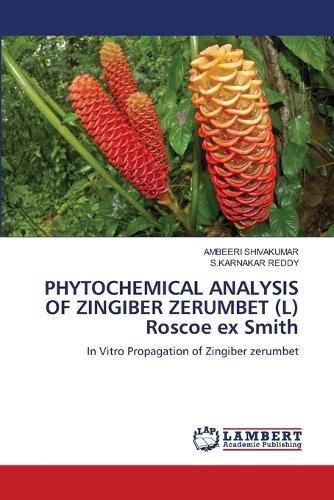Readings Newsletter
Become a Readings Member to make your shopping experience even easier.
Sign in or sign up for free!
You’re not far away from qualifying for FREE standard shipping within Australia
You’ve qualified for FREE standard shipping within Australia
The cart is loading…






Zingiber zerumbet (L.) roscoe ex Smith is perennial aromatic plant species in the Zingiberaceae family, it primarily found in Asia tropical and subtropical regions, it is used as food and medicine. Numerous pharmacological effects of plant consisting of anti-inflammatory, anti-tumor, anti-allergic and anti-bacterial purpose. Modern cultivation and conservation measures are necessary to prevent overexploitation, which goes well beyond their natural potential for regeneration due to declining populations. For sustainable cultivation and conservation, high-frequency multiplication techniques in particular need to be developed. Through quick multiplication rates, in vitro propagation (also known as tissue culture) can address the problems and aid in sustainable breeding, cultivation, and preservation. True-to-type progenies and homogeneity in the products, such as the bioactive chemicals, are offered by micropropagation. Additionally, the preservation of germplasm in vitro (from healthy meristems) has benefits such as reducing the need for space and labour as well as preventing the buildup of infections and mutations.
$9.00 standard shipping within Australia
FREE standard shipping within Australia for orders over $100.00
Express & International shipping calculated at checkout
Zingiber zerumbet (L.) roscoe ex Smith is perennial aromatic plant species in the Zingiberaceae family, it primarily found in Asia tropical and subtropical regions, it is used as food and medicine. Numerous pharmacological effects of plant consisting of anti-inflammatory, anti-tumor, anti-allergic and anti-bacterial purpose. Modern cultivation and conservation measures are necessary to prevent overexploitation, which goes well beyond their natural potential for regeneration due to declining populations. For sustainable cultivation and conservation, high-frequency multiplication techniques in particular need to be developed. Through quick multiplication rates, in vitro propagation (also known as tissue culture) can address the problems and aid in sustainable breeding, cultivation, and preservation. True-to-type progenies and homogeneity in the products, such as the bioactive chemicals, are offered by micropropagation. Additionally, the preservation of germplasm in vitro (from healthy meristems) has benefits such as reducing the need for space and labour as well as preventing the buildup of infections and mutations.